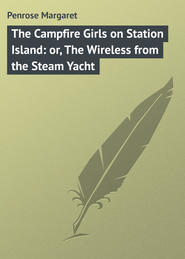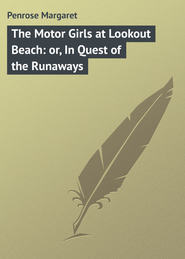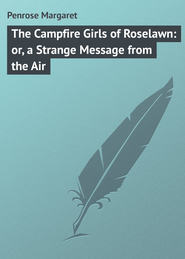По всем вопросам обращайтесь на: info@litportal.ru
(©) 2003-2024.
✖
Dorothy Dale at Glenwood School
Настройки чтения
Размер шрифта
Высота строк
Поля
While at the blacksmith's Ned and Nat had heard of the escape of Anderson and so recognized him at once when they encountered him in their car.
"I told you we would have three adventures," Tavia reminded Dorothy.
"And we are not home yet," added Nat, laughing.
The wagon rattled on, now and then clanging its gong to warn mere "people," not to interfere with the law – to keep out of its way.
"We are in some village," said Dorothy, looking out the little glass window at front, and seeing street lights along the way.
Presently a gang of urchins discovered the patrol wagon and as the horses slowed up around a corner the youngsters tried to get on the steps to catch a glimpse of the "prisoners."
"Look at that!" exclaimed Tavia, laughing. "Wonder what they think we were taken up for?"
"Oh, I feel so queer about it," said Dorothy, plainly discomfited. "I wish we could get out."
At that moment the wagon sprang forward, the horses having been urged on, and before Nat had a chance to reply to Dorothy's wish they were rattling on, at greater speed than had been attained during the entire trip.
To reach Danvers jail the route was through Dalton, and now Tavia could see Dalton houses, Dalton churches, and there was the postoffice block! Surely the officer would not let them out right in the center!
"Here you are!" called the man at front, while the wagon stopped and Nat saw they were in front of the bank, the most conspicuous spot in all Dalton.
There was nothing for them to do but to alight of course, and, by the time the officers had vacated the back step, and Nat put his foot on it, a crowd of people surrounded the wagon – waiting to see the "prisoners" get out.
"Girls!" exclaimed the surprised crowd in chorus.
"Tavia Travers!" declared one voice, as Tavia showed her head.
"And if that isn't Dorothy Dale! Well, they're nice girls!" came another sneer, "talk about being good and always preaching." This, was almost in Dorothy's ear. "I guess they had better begin at home!"
Tears came to Dorothy's eyes. If her father were only there to take her hand – could that be little Joe?
"Dorothy! Dorothy!" called a young voice. "Come this way! We have been down to the telegraph office," went on Joe, for Dorothy was beside him now, "and we never had any idea you were in that wagon. Ned just got back. He was going out again to look for you."
"Is Ned all right?" Dorothy managed to say, while Nat was thanking the officers who were in haste to be on their way again.
"Oh, he's all right, but I guess he had an awful time. He was too hurried to tell us about it, for he said he had to go back – There's his car now! Ned! Ned!" shouted Joe at the top of his voice, while Nat, seeing his brother at the same moment, gave his familiar whistle.
Tavia had not yet been able to extricate herself from the crowd. Many of the boys recognized her, and she was plied with all kinds of curious questions. What had happened? Had they been arrested for speeding? (Ned's presence in the automobile prompting this query), or was someone hurt? In fact, there seemed to be no limit to the quality or quantity of questions that were being poured into Tavia's ears.
But Tavia was not the sort of girl to make explanations – under the circumstances. If friends, or those who appeared to be friends, could so easily lose all sympathy, and become so annoyingly curious about her and Dorothy, why then, she declared to herself (and also made it plain to some of the boys who were at liberty to tell the others), what really did happen "was none of their business."
But unfortunately there were, in that crowd, those too willing to draw their own conclusions, especially as regarded Dorothy Dale, a girl of whom so many others had been jealous.
Dorothy was aware of some of the remarks made, but she little realized what a part the patrol wagon ride was to play in her life, nor how a girl who had observed her in the vehicle was to use that knowledge against her.
CHAPTER VI
A RIDE AND ITS CONSEQUENCES
Mrs. Winthrop White was talking earnestly to her brother, Major Dale. She had come in from the Cedars the morning after the memorable ride in the Fire-Bird, and was now in the major's study, discussing the situation with Dorothy's father.
"But the child has had so many shocks lately, brother," said Mrs. White. "It does seem the only practical plan is to remove her entirely from these surroundings. Of course, it will be hard for you to let her go away, but you must remember, Dorothy has always been a little over-strained with care for one of her years, and now that your means will allow it, she should have every possible advantage to make up for what she may have lost in the way of nerve force."
"Oh, I am sure you know, sister," replied the major, "I would not deprive the child of anything she should have, no matter what it cost me, in money or – the loss of her company. She has certainly been my Little Captain, for I can always depend upon her to keep the young troopers in line – "
"But why remain here at all? You can give up business now. Do, brother, come and make your home with me. I really need you so often, when I have no one to advise with about the boys. And Joe and Roger would be so much better off with me to look after them. Mrs. Martin has done wonderfully well for her years, but she is no longer able to see to them properly. Just give up this place and come to the Cedars," urged Mrs. White.
"I would not know how to leave dear old Dalton or my newspaper," mused the major. "Of course you are very good to think of bothering with another family. Most women think one family enough to bring up."
"Indeed, I need something to do," argued the sister, "and Roger would be a perfect treat to me. He is such a darling. Joe will go to school, of course (already taking it for granted that her invitation would be accepted), but I would have Roger taught at home for this year. He is too young to mix up with all the others."
"I am sure it would be good for the children – "
"And for yourself! Why, you are not too old to enjoy your life. The idea of a man of less than fifty years, considering himself old," and Mrs. White laughed in that captivating manner of hers, that had so often won her cause when all other arguments failed. "And that school you speak of for Dorothy, the one in the mountains of New England, what did you call it?"
"The Glenwood School," replied the major. "Mrs. Pangborn, who conducts it, is an old friend of mine, and if I should trust Dorothy with anyone it would be with Louise Pangborn, for she knew Dorothy's mother and would be sure to take an interest in her daughter."
"The very thing! Capital!" exclaimed Mrs. White enthusiastically. "We must make arrangements at once. There is little time left before the term opens. Dear me, brother, some women may like to idle, but give me a girl to dress up for school! Perhaps because I have never had the joy for doing it for my own daughter, I so love to take up Dorothy and experiment on her. No girl at school shall be better equipped than Dorothy Dale – "
"Now take care, sister. We are plain folks, you know."
"Not one whit plainer than your sister Ruth. I shall only get Dorothy things that befit her station, in fact the best dressed girls do not, by any means have more clothes than others. They simply have what is needed."
"Oh, I know! I know I can depend upon you, Ruth. Only I also know you think Dorothy – "
"A wonderfully pretty and attractive girl, and one who must wear the right kind of clothes. There, I feel I am looking through the shops now. I must admit I have a weakness for pretty things, whether girls or their dresses."
"Strange I should have so lately received a letter from Mrs. Pangborn inquiring about Dorothy," remarked the major. "I have it some place," and he pulled a packet of papers from his desk, soon finding the one wanted. "There," he went on, glancing over the missive, "Louise says she has now two assistants, a Miss Crane and a Miss Higley."
"Might I see the letter?" asked Mrs. White, already assuming the mother part toward Dorothy, and feeling it her duty to know all she might be able to find out concerning the woman to whom Dorothy would be entrusted.
"Why, certainly," replied the major, handing her the letter. She glanced over the paper. "There," she said presently, smiling. "I fancy I see Miss Crane, whom Mrs. Pangborn describes as being such a favorite with the girls. And the other, Miss Higley – her name is enough. She must be the sort of teacher who does good work in classes, but seems to put a damper on the girls' pranks. Of course, such a person is always valuable in a boarding school," and she handed back the paper, "but what a lot of trouble they can make! I went to a boarding school myself, you know, and I know and remember all about the Miss Higleys."
"Then you think it would be a good plan to send Dorothy to Glenwood?" and the major's voice showed that he looked favorably upon the proposition.
"Glenwood School, in the mountains of New England! I can see the tags on Dorothy's trunks," she replied merrily. "Nothing could be better. And that splendid mountain air! Why, you won't know the child when she comes home for her holiday. But I am going to write this very morning. Or will you do it? And I will write in reply to the next. Yes, I think that would be better. And now I am going right up to Dorothy and tell her all about it. The child had such a headache from her experiences yesterday that I insisted upon her lying down. Wasn't that the most absurd thing for those children to ride to town in the police patrol? The boys will never stop talking of it. And Tavia Travers thinks it the joke of her life. But Dorothy is not keen on that sort of jokes. She does not relish the curiosity which the incident has stirred up. I could see that this morning, when those school friends were talking it over with her."
"Dorothy is a very sensitive girl."
"All fine natures are sensitive, Allen. They neither offend nor relish being offended. It is perfectly natural that the child should resent such remarks as some of those I have heard passed about the patrol ride."
"Of course they only came from children," apologized the major, "and youngsters will have their say."
"Yes, but sometimes the 'say' of jealous young girls may go a long way. A jealous girl is, I believe, even a more dangerous enemy than a woman scorned, about whom so much is written and said. But I am sure Dorothy can hold her own in spite of any girl."
Why had Mrs. White been so apprehensive about the small talk she had overheard? What could any one say against Dorothy Dale?
That afternoon a school friend called on Dorothy and brought with her a young girl who had been spending part of her vacation at the MacAllister home. She was introduced as Miss Viola Green of Dunham, and while rather a pretty girl she had something in her manner that made Dorothy feel uncomfortable. This unaccountable dislike on Dorothy's part was heightened when Tavia went over to the veranda where the girls were sitting, and upon Alice introducing Tavia to her friend the latter merely bowed stiffly, and refused to accept the hand that Tavia had offered in greeting. This was all the more strange since Alice was so splendid a girl herself.
"I told you we would have three adventures," Tavia reminded Dorothy.
"And we are not home yet," added Nat, laughing.
The wagon rattled on, now and then clanging its gong to warn mere "people," not to interfere with the law – to keep out of its way.
"We are in some village," said Dorothy, looking out the little glass window at front, and seeing street lights along the way.
Presently a gang of urchins discovered the patrol wagon and as the horses slowed up around a corner the youngsters tried to get on the steps to catch a glimpse of the "prisoners."
"Look at that!" exclaimed Tavia, laughing. "Wonder what they think we were taken up for?"
"Oh, I feel so queer about it," said Dorothy, plainly discomfited. "I wish we could get out."
At that moment the wagon sprang forward, the horses having been urged on, and before Nat had a chance to reply to Dorothy's wish they were rattling on, at greater speed than had been attained during the entire trip.
To reach Danvers jail the route was through Dalton, and now Tavia could see Dalton houses, Dalton churches, and there was the postoffice block! Surely the officer would not let them out right in the center!
"Here you are!" called the man at front, while the wagon stopped and Nat saw they were in front of the bank, the most conspicuous spot in all Dalton.
There was nothing for them to do but to alight of course, and, by the time the officers had vacated the back step, and Nat put his foot on it, a crowd of people surrounded the wagon – waiting to see the "prisoners" get out.
"Girls!" exclaimed the surprised crowd in chorus.
"Tavia Travers!" declared one voice, as Tavia showed her head.
"And if that isn't Dorothy Dale! Well, they're nice girls!" came another sneer, "talk about being good and always preaching." This, was almost in Dorothy's ear. "I guess they had better begin at home!"
Tears came to Dorothy's eyes. If her father were only there to take her hand – could that be little Joe?
"Dorothy! Dorothy!" called a young voice. "Come this way! We have been down to the telegraph office," went on Joe, for Dorothy was beside him now, "and we never had any idea you were in that wagon. Ned just got back. He was going out again to look for you."
"Is Ned all right?" Dorothy managed to say, while Nat was thanking the officers who were in haste to be on their way again.
"Oh, he's all right, but I guess he had an awful time. He was too hurried to tell us about it, for he said he had to go back – There's his car now! Ned! Ned!" shouted Joe at the top of his voice, while Nat, seeing his brother at the same moment, gave his familiar whistle.
Tavia had not yet been able to extricate herself from the crowd. Many of the boys recognized her, and she was plied with all kinds of curious questions. What had happened? Had they been arrested for speeding? (Ned's presence in the automobile prompting this query), or was someone hurt? In fact, there seemed to be no limit to the quality or quantity of questions that were being poured into Tavia's ears.
But Tavia was not the sort of girl to make explanations – under the circumstances. If friends, or those who appeared to be friends, could so easily lose all sympathy, and become so annoyingly curious about her and Dorothy, why then, she declared to herself (and also made it plain to some of the boys who were at liberty to tell the others), what really did happen "was none of their business."
But unfortunately there were, in that crowd, those too willing to draw their own conclusions, especially as regarded Dorothy Dale, a girl of whom so many others had been jealous.
Dorothy was aware of some of the remarks made, but she little realized what a part the patrol wagon ride was to play in her life, nor how a girl who had observed her in the vehicle was to use that knowledge against her.
CHAPTER VI
A RIDE AND ITS CONSEQUENCES
Mrs. Winthrop White was talking earnestly to her brother, Major Dale. She had come in from the Cedars the morning after the memorable ride in the Fire-Bird, and was now in the major's study, discussing the situation with Dorothy's father.
"But the child has had so many shocks lately, brother," said Mrs. White. "It does seem the only practical plan is to remove her entirely from these surroundings. Of course, it will be hard for you to let her go away, but you must remember, Dorothy has always been a little over-strained with care for one of her years, and now that your means will allow it, she should have every possible advantage to make up for what she may have lost in the way of nerve force."
"Oh, I am sure you know, sister," replied the major, "I would not deprive the child of anything she should have, no matter what it cost me, in money or – the loss of her company. She has certainly been my Little Captain, for I can always depend upon her to keep the young troopers in line – "
"But why remain here at all? You can give up business now. Do, brother, come and make your home with me. I really need you so often, when I have no one to advise with about the boys. And Joe and Roger would be so much better off with me to look after them. Mrs. Martin has done wonderfully well for her years, but she is no longer able to see to them properly. Just give up this place and come to the Cedars," urged Mrs. White.
"I would not know how to leave dear old Dalton or my newspaper," mused the major. "Of course you are very good to think of bothering with another family. Most women think one family enough to bring up."
"Indeed, I need something to do," argued the sister, "and Roger would be a perfect treat to me. He is such a darling. Joe will go to school, of course (already taking it for granted that her invitation would be accepted), but I would have Roger taught at home for this year. He is too young to mix up with all the others."
"I am sure it would be good for the children – "
"And for yourself! Why, you are not too old to enjoy your life. The idea of a man of less than fifty years, considering himself old," and Mrs. White laughed in that captivating manner of hers, that had so often won her cause when all other arguments failed. "And that school you speak of for Dorothy, the one in the mountains of New England, what did you call it?"
"The Glenwood School," replied the major. "Mrs. Pangborn, who conducts it, is an old friend of mine, and if I should trust Dorothy with anyone it would be with Louise Pangborn, for she knew Dorothy's mother and would be sure to take an interest in her daughter."
"The very thing! Capital!" exclaimed Mrs. White enthusiastically. "We must make arrangements at once. There is little time left before the term opens. Dear me, brother, some women may like to idle, but give me a girl to dress up for school! Perhaps because I have never had the joy for doing it for my own daughter, I so love to take up Dorothy and experiment on her. No girl at school shall be better equipped than Dorothy Dale – "
"Now take care, sister. We are plain folks, you know."
"Not one whit plainer than your sister Ruth. I shall only get Dorothy things that befit her station, in fact the best dressed girls do not, by any means have more clothes than others. They simply have what is needed."
"Oh, I know! I know I can depend upon you, Ruth. Only I also know you think Dorothy – "
"A wonderfully pretty and attractive girl, and one who must wear the right kind of clothes. There, I feel I am looking through the shops now. I must admit I have a weakness for pretty things, whether girls or their dresses."
"Strange I should have so lately received a letter from Mrs. Pangborn inquiring about Dorothy," remarked the major. "I have it some place," and he pulled a packet of papers from his desk, soon finding the one wanted. "There," he went on, glancing over the missive, "Louise says she has now two assistants, a Miss Crane and a Miss Higley."
"Might I see the letter?" asked Mrs. White, already assuming the mother part toward Dorothy, and feeling it her duty to know all she might be able to find out concerning the woman to whom Dorothy would be entrusted.
"Why, certainly," replied the major, handing her the letter. She glanced over the paper. "There," she said presently, smiling. "I fancy I see Miss Crane, whom Mrs. Pangborn describes as being such a favorite with the girls. And the other, Miss Higley – her name is enough. She must be the sort of teacher who does good work in classes, but seems to put a damper on the girls' pranks. Of course, such a person is always valuable in a boarding school," and she handed back the paper, "but what a lot of trouble they can make! I went to a boarding school myself, you know, and I know and remember all about the Miss Higleys."
"Then you think it would be a good plan to send Dorothy to Glenwood?" and the major's voice showed that he looked favorably upon the proposition.
"Glenwood School, in the mountains of New England! I can see the tags on Dorothy's trunks," she replied merrily. "Nothing could be better. And that splendid mountain air! Why, you won't know the child when she comes home for her holiday. But I am going to write this very morning. Or will you do it? And I will write in reply to the next. Yes, I think that would be better. And now I am going right up to Dorothy and tell her all about it. The child had such a headache from her experiences yesterday that I insisted upon her lying down. Wasn't that the most absurd thing for those children to ride to town in the police patrol? The boys will never stop talking of it. And Tavia Travers thinks it the joke of her life. But Dorothy is not keen on that sort of jokes. She does not relish the curiosity which the incident has stirred up. I could see that this morning, when those school friends were talking it over with her."
"Dorothy is a very sensitive girl."
"All fine natures are sensitive, Allen. They neither offend nor relish being offended. It is perfectly natural that the child should resent such remarks as some of those I have heard passed about the patrol ride."
"Of course they only came from children," apologized the major, "and youngsters will have their say."
"Yes, but sometimes the 'say' of jealous young girls may go a long way. A jealous girl is, I believe, even a more dangerous enemy than a woman scorned, about whom so much is written and said. But I am sure Dorothy can hold her own in spite of any girl."
Why had Mrs. White been so apprehensive about the small talk she had overheard? What could any one say against Dorothy Dale?
That afternoon a school friend called on Dorothy and brought with her a young girl who had been spending part of her vacation at the MacAllister home. She was introduced as Miss Viola Green of Dunham, and while rather a pretty girl she had something in her manner that made Dorothy feel uncomfortable. This unaccountable dislike on Dorothy's part was heightened when Tavia went over to the veranda where the girls were sitting, and upon Alice introducing Tavia to her friend the latter merely bowed stiffly, and refused to accept the hand that Tavia had offered in greeting. This was all the more strange since Alice was so splendid a girl herself.











